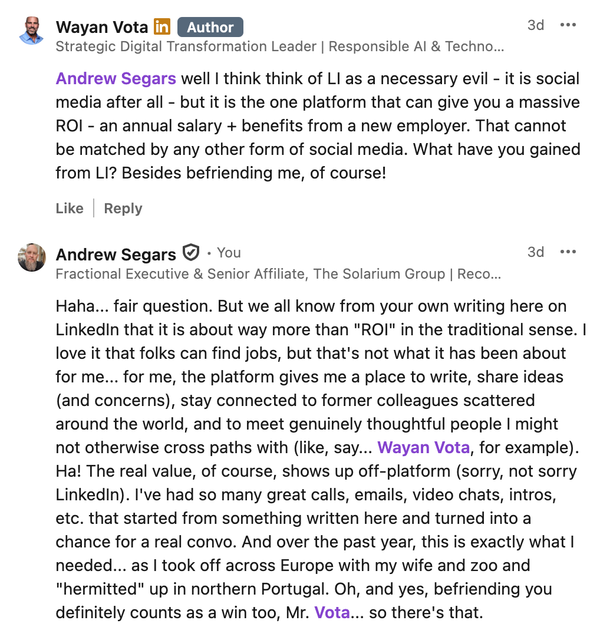Work-Life Balance: Thriving, Not Just Surviving
Work will take everything we give it—unless you set boundaries. Burnout isn’t success, and work-life balance isn’t a luxury. It’s time to work smarter, set limits, and prioritize what truly matters.

Making Work Fit Your Life, Not the Other Way Around
Somewhere along the way, we got tricked into believing that being busy is the same as being successful. Or that working harder is an easier way to impress the bosses than working smarter. That we’ll take time to relax after work is finished, not as part of our work life.
Well, later has a habit of never showing up. And our wellbeing, including that of our family and friends, is what suffers if we cannot find ways to balance work and life.
We burn ourselves out chasing promotions, staying late to "prove our dedication," and checking emails at dinner like it’s some kind of Olympic sport (I have earned multiple gold medals in this particular event myself). But here’s the truth: our jobs will take everything we give them. Everything. It won’t set boundaries for you. It won’t tell you to go home. It won’t tell you it can wait. It won’t prioritize anything over itself. It’s a selfish jerk, to be honest. And if you’re not careful, it’ll squeeze the joy right out of your life before you even realize it.
And here’s something most people don’t think about: work-life balance isn’t just for when you have a job. It’s just as critical when you’re between jobs, pivoting careers, or figuring out what’s next. In fact, it might be even worse, since more stress is involved. Sound familiar, anyone?
When faced with a job search, particularly if it is unexpected, our first instinct is often to go into overdrive—network harder, apply to everything, throw ourselves into the search like it’s our full-time job. But that’s a trap. Burning out while job hunting is just as bad as burning out in a job—maybe worse.
So, let’s talk about how to keep work (and career transitions) in their place—so life can take the priority it deserves. And for those of you who know me, this is a more of a “do as I say” not a “do as I do” kind of situation, I realize…but bear with me here. I’m trying to action these things in my life as we speak, and I can already feel my efforts paying dividends.
1. Work Will Replace You. Your Family Won’t.
If you quit tomorrow, your company will survive. It’ll hire someone new, adjust, and move on.
Your family? They don’t get a replacement you. You are it. Well, I suppose you can be replaced there too, but that’s not the topic of this article. Thankfully.
So why do so many of us give our best energy to our jobs while giving our families and friends the tired, distracted, barely-present version of ourselves? I mean, I’ve never personally done this (ahem), but I have heard that some people do.
In all seriousness, I lived this reality during my years in international development—often on the road, constantly fretting about deadlines, prioritizing email (email!) over spending time enjoying an amazing meal. Thinking about it now makes me mad, but the fact is—I did it. I always had an excuse. Just a few more minutes online. Just one more message. I told myself it was temporary. But it never was. Because work never stops unless we stop it.
And this doesn’t just apply when you have a job. When pivoting careers, you have to make a choice: obsess over the job search 24/7, or keep your sanity intact by balancing it with things that actually matter.
✅ Actionable Tip: Schedule non-negotiable time for yourself. For your family. For your friends. Yes, even smack in the middle of a job hunt. Even in an unexpected career pivot. Treat it like an unmissable meeting with the CEO—the CEO of Your Life, Inc. Work around it, don’t just “fit it in.”
2. Hustle Culture is a Scam—Including in Job Hunting.
Somewhere along the way, we started treating exhaustion like an achievement. "Look how busy I am!" became a flex.
But let’s be real: hustle culture doesn’t make you more successful—it makes you more tired. Overworking doesn’t guarantee better results (in fact, the opposite is usually true); it just guarantees burnout.
When I first started planning my next steps (yes, even before losing my job), my instinct was to throw myself into it non-stop. But before I even got started (thankfully), I realized that applying to everything wasn’t just ineffective—it was draining. Instead of working harder, I decided to work smarter. I prioritized meaningful networking over blindly applying. I took breaks. I used ChatGPT (yep, sure did). I made sure my job search fit into my life, not the other way around.
And guess what? The world didn’t end because I stepped away from LinkedIn for a weekend or skipped making one last revision to my resume. (Spoiler alert: I’ve actually stopped applying for jobs altogether, but more on that later. And honestly? I feel great. And totally zen.)
✅ Actionable Tip: Whether you’re working or job hunting, don’t equate more effort with better results. Focus on the high-impact actions and ignore the rest. Working smarter, not harder, isn’t just a saying—it’s the way forward. And bonus: it might just give you back some actual life in the process.
3. A Little Workplace Levity Can Save Your Sanity.
Work doesn’t have to be soul-crushing. In fact, adding a little humor and personality can make it a lot more bearable.
In Top Ten Ways to Upgrade Your Work Self in 2025, I talked about how well-placed humor at work not only makes work more enjoyable, but it makes you more enjoyable. Yep, I said it. You don’t have to be 100% serious 100% of the time to do your job well. And when work (and your co-workers) is more enjoyable, get this—you may actually do a better job. Whether it’s taking a few minutes to tell a well-placed joke, or responding to an overly serious Slack message with a meme of a cat playing with a monkey, or dare I say, setting up a witty out-of-office message, humor reminds everyone (including yourself) that work is just work.
Same goes for job hunting. I’ve sent out applications with cover letters that actually sound like me—rather than robotic corporate jargon or diplo-speak. They haven’t always landed, but at least they are honest. My favorite addition to my LinkedIn bio so far? “And while I take my work seriously, I don’t take myself too seriously—I bring energy, humor, and an uncanny ability to write legendary out-of-office messages.” Don’t believe me? Check out my bio.
✅ Actionable Tip: Whether at work or on the job hunt, inject some personality into your interactions. It makes everything way more tolerable. It also totally helps reduce stress and simply puts you in a better mood, which is infectious. Give it a try, you won’t regret it.
4. More Hours ≠ More Success.
If you can finish your work in six hours, don’t stretch it to ten just to "look busy."
In fact, multiple studies (well, and just good common sense) show that working excessive hours leads to diminishing returns, with well-rested workers being more productive and efficient than those who are chronically overworked.
One of my favorite studies is from Iceland. Get this. They cut the workweek to 35 hours (without cutting pay), and employees reported that their lives got dramatically better. Go figure. Less stress, better work-life balance—and no drop in productivity (in fact, it often improved). Turns out, overwork isn’t a badge of honor—it’s just...overwork. I won’t lie, this had me searching for jobs in Iceland for a minute.
And this applies just as much to job hunting. If you spend 12 hours a day scrolling job boards, refreshing your inbox, and tweaking your resume for the 50th time, you’re not job hunting—you’re spiraling. Spend less time, not more, and the quality of your work (or job hunt) will thank you.
✅ Actionable Tip: Set work and job search hours. When time’s up, stop. Go outside. Read a book. Get in a workout. Eat a good meal. Or, heck, spend time with your family. 🙂Seriously, do literally anything else.
5. Self-Care is a Work Requirement, Not a Weekend Activity.
Burnout isn’t just a personal problem—it’s a performance problem.
Skipping meals, sacrificing sleep, drinking too much, and doom-scrolling until 2 AM doesn’t make you more productive—it makes you worse at everything. Everything.
Like some of you, I learned this the hard way. There was a point in my career when I treated self-care like a "nice-to-have" rather than a necessity. I was convinced I could just power through overwork and even exhaustion. (Spoiler alert: I could not.) I ignored proper sleep, skipped workouts, ate horribly, and basically let work take over my life. And the reward for all my sacrifice? Uhhh, you guessed it—more work.
Seriously, self-care isn’t optional. Sleep, exercise, good food, time outdoors, great conversation, and real breaks need to become part of your job search strategy. Not a nice-to-have. And guess what? Taking care of yourself will make you better at everything. Everything.
✅ Actionable Tip: Treat self-care (whatever that looks like to you) like a non-negotiable meeting. Because if you don’t, you’ll burn out well before you ever come close to hitting your goals.
6. Your Job is Supposed to Support Your Life—Not Consume It.
The whole point of having a job is to fund a life you enjoy. Well, okay, that’s not the only point of having a job, but it helps make this point, so hear me out.
If your job (or your approach to work) is consuming all your time and energy, it’s time to reevaluate.
I had this realization on a random Tuesday night (well, truth be told, I may have had this “realization” more than once, but didn’t act on it immediately)—when I was still glued to my laptop, working on something I can’t even remember now. My wife, after having prepared an absolutely spectacular meal, and mid-dishwashing (like that part was her job too) looked over and casually asked, "Is there any way you can do that later?" Oof. I sat up and actually listened, not just to her words, but to the disappointed look on her face.
Something had to change.
And if you’re navigating a career transition, remind yourself: the goal isn’t just to get hired—it’s to find a job that fits into your actual life. The perfect opportunity is not worth your health and sanity.
✅ Actionable Tip: Regularly check in with yourself and your loved ones (always be open to feedback). Is your job (or job search) supporting your life—or consuming it? If it’s the latter, something needs to change. And fast.
Conclusion: Work Will Always Demand More—It’s Your Job to Say "Enough."
Work will never set boundaries for you. It will always ask for more. More hours, more effort, more availability.
It’s your job to say enough.
This is true whether you’re employed, job hunting, or somewhere in between. Work-life balance isn’t just for people with jobs—it’s for everyone, at every stage.
So, let’s stop glorifying overwork and start prioritizing what actually matters. Work pays the bills, sure—but joy, relationships, and time? That’s the real wealth. I kinda sound like a motivational speaker here, but you know it’s all true. Take care of yourself!
💡 Final Thought: Your job is replaceable. Your health, your happiness, and your time with loved ones? Not so much. Prioritize wisely. We all know the answer; we just have to make it happen, and hold ourselves to it. Your future self will thank you.
Over to You:
How do you maintain work-life balance? Do you struggle with setting boundaries? Have you got it all figured out? Any tips or tricks to share? Drop a comment below—I’d love to hear your thoughts. 🚀




